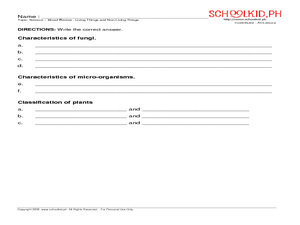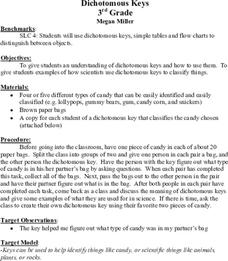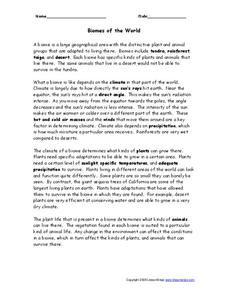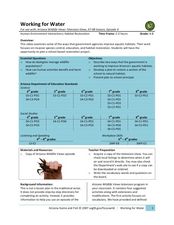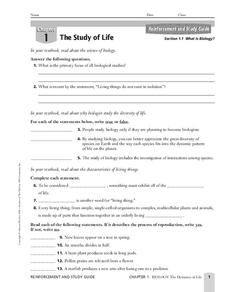Curated OER
Classifying Living and Non-Living Objects
Students investigate living organisms and define the properties of a living species. In this life characteristic activity, students examine plants in their class and discuss whether or not they are alive. Students create a living vs....
Curated OER
Science - Mixed Review: Living Things and Non Living Things
In this living and non living things instructional activity, students fill in a mixed review that has them answering questions in the true and false, short answer, and classification formats. Students answer 59 questions.
Curated OER
Ocean Life Zones
For this ocean worksheet, learners answer questions about ocean life, the plants and animals of the ocean and their classification, the major life zones of the ocean and questions about an animal of their choice that lives in the ocean.
Curated OER
Sunflowers, The Circle of Life
Students investigate and observe plants and animals in nature. They find out how life cycles are present in much of nature. Students use appropriate graphic organizers for information gathering. Students use sequence life cycles of...
Curated OER
Creepy Critters
Students develop a classification scheme based on the structural features of organisms. In this organism lesson students divide into teams and complete a fun activity.
Curated OER
Home Sweet Home
Students examine the change in the diversity of animals living in an area before and after development. In order to do this, students need to have access to an area near their school which is undeveloped. A good, "real life" lesson.
Curated OER
Big Cats Sounds
Students explore the sounds of big cats. In this animal science lesson, students listen to the sounds of the big cats, such as lions and tiger, on a suggested website. Students research how the big cats use their sounds and write a...
Curated OER
The Three Worm Phyla
Ninth graders examine the three worm phyla. In this classification instructional activity, 9th graders observe, compare and contrast the planarian, tapeworm, and fluke.
Curated OER
Dichotomous Keys
Third graders practice using dichotomous keys. They discover why scientists use them and why it is important to classify animals. They use candy to practice classifying objects and move on to classifying animals.
Curated OER
Life Has A History
In this biology instructional activity, students identify and match various classes of species found today. Then they explain why biodiversity exists today on earth and define evolution. Students also describe who a paleontologist is and...
Alabama Learning Exchange
Endangered Species: What Are They And How Can We Help Them?
Students research endangered species online and prepare a presentation identifying species, and the reasons why species are becoming endangered,
Curated OER
What does 'Endangered' mean?
Students discuss a variety of teacher led discussion questions about what makes an animal endangered. They take a short field trip to an open area and set a boundary for each child for them to either write or draw about how the location...
Curated OER
SKULL DIVERSITY
Middle schoolers explore the similarities and differences of animal skulls.
Curated OER
Biomes of the World
In this biomes worksheet, learners read an article on biomes and answer 10 multiple choice, short answer or true and false questions relating to biomes.
Curated OER
Native Versus Exotic
Students investigate the presence of exotic and natural species in the ecosystem. They define the differences between exotic and native while looking at one specific ecosystem in Maryland. They write how the exotic species are considered...
Curated OER
Intertidal Field Trip
Young scholars explore an intertidal zone. For this science lesson, students travel to an intertidal zone. Young scholars collect data and create species accumulation curves.
Curated OER
Blue Planet: Open Ocean
Students research facts about animal species. In this ocean instructional activity students view a video, prepare illustrated cards and create a food-web display.
Curated OER
Working for Water
Students examine the ways that government works to help improve aquatic habitats. In this water habitats lesson plan students view a video and plan a school restoration project.
Curated OER
Birds of the Northeast
Students identify several common birds through field observations, preserved specimens and personal experience. They classify the species and choose one to research. They draw a migration map and participate in a project that benefit...
Curated OER
What is Biology?
In this science of biology worksheet, learners will review the concepts relating to biology including the characteristics of living things, the process of reproduction, adaptations, and evolution. This worksheet has 5 short answer, 3...
Curated OER
Explorations Through Time
In this earth history worksheet, learners visit a website and complete 15 fill in the blank and 8 short answer questions based on what they read. Topics include biodiversity, animal kingdoms, evolution, fossils, and extinction.
Curated OER
Touching Traits
Students describe objects using only their sense of touch. For this lesson on describing characteristics, students use only their sense of touch to describe an unseen object in a box. This lesson can be used an an introduction to plant...
Curated OER
Bacterium Cells
In this bacteria worksheet, students read several elements of bacterium cells, their diet, types, locations, reproduction, resting stages, effects of, and classification. Students also study a cross-section of bacterium cells.
Curated OER
Survival Features
Third graders identify features of producers, herbivores and carnivores. They discuss the features that aid in survival for those animals. They organize animals into categories to complete the lesson.



